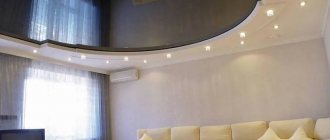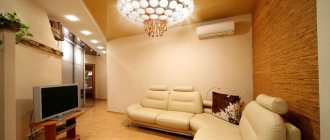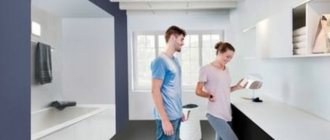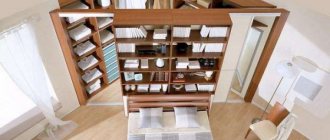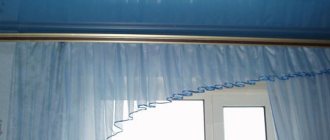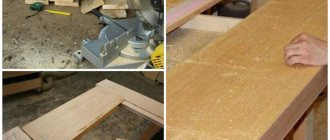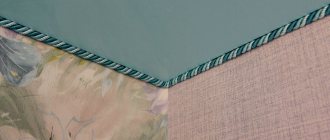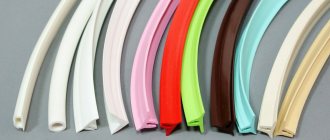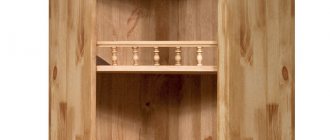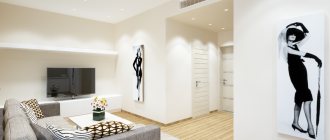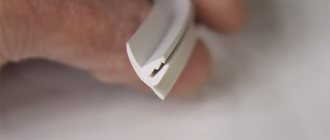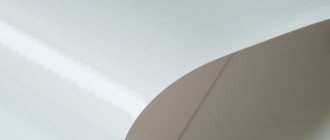Home / Types of ceilings / Stretch ceilings / Features, pros and cons of chintz stretch ceilings
Among tension coverings, those that have certain unique features or properties stand out. It is to this category that chintz stretch ceilings can be attributed. This is an excellent alternative to the already boring glossy and conventional fabric coatings.
Ceiling installation and lighting
Stretch ceilings can be mounted not only to walls, but also to the frame structure for plasterboard.
Only for this you need to very carefully ensure the strength of the ceiling, carefully tightening each connection with a self-tapping screw and installing additional slopes. Lamps installed on the ceiling are limited in terms of heat output. For incandescent lamps, the limit is 60 watts, and for halogen lamps - 35. In addition, for the installation of hidden lamps, it is necessary to prepare sites for them before installing the ceiling. How to install them correctly can be seen in the photos taken from different angles.
If stretch ceilings, the pros and cons of which we have discussed in this article, still attract you, then we can only rejoice and wish you success! We hope that this solution will help make your home more cozy and comfortable.
High temperatures
Almost everywhere you can find information that it is recommended to install a suspended ceiling in a swimming pool and sauna, in a bathhouse and steam room, because... There is practically no condensation on the coating, and as a result, no fungus and mold. But, for some reason, it is hushed up that in rooms with high temperatures, toxic substances are released several times more . So, you can imagine that when you come to a sauna or bathhouse for health reasons, you can get poisoned by cadmium or chlorine, which is part of PVC sheets.
Stretch ceilings Pros
Fabric stretch ceiling - pros and cons in the hall photo
It can also be noted that during the installation of the structure, there is no construction waste left, and it also does not require the mandatory removal of furniture, which will typically have a positive effect on the timing of construction and repair work and discomfort for the owners.
- The second advantage of suspended ceilings is its aesthetics. Stretch ceilings create an ideal, flat surface, while perfectly masking any gross defects in the main ceiling, as well as communication wires for air conditioners, supply ventilation, alarm sensors, lighting cables, etc.
- Thirdly, it is its durability and reliability. For many consumers, this is one of the important factors. The minimum warranty period for the product is 10 years. This is not to say that during this period they will lose their strength, original texture and color of the canvas. Without exposure to external and mechanical factors, mounting fasteners and sheets can maintain their reliability and strength for more than 30 years.
- The fourth plus is safety. Stretch ceilings are environmentally friendly and fire-resistant, odorless, do not emit toxic substances, do not rot, are anti-allergenic and meet all international norms and standards.
- Fifth is the variety of applications of designer ceilings in absolutely any room or space. Stretch ceilings can be used in the nursery, in the bedroom (fabric), in the hall (satin), in the kitchen, in bathrooms (glossy), in the corridors of clinics (matte) and even in rooms with high humidity like a swimming pool. Thanks to its elastic surface, a skilled specialist can give it any design and shape, the main thing is whatever the customer’s imagination limits.
- Sixth is its practicality. Such ceilings are easy to install and easy to dismantle. If desired, the dismantled canvas can be re-stretched onto the ceiling, without losing quality. In case of shrinkage and deformation of the building, the surface of the canvas does not crack, crumble or create chips.
- Seventh plus - Stretch ceilings have moisture-resistant, sound-absorbing and heat-insulating properties. Even if you are flooded by neighbors from above, the canvas of such a ceiling can withstand a load of up to 100 liters per square meter. meter, while excluding flooding and damage to furniture and other interior items in the room. The air flow between the film and the main ceiling creates thermal insulation.
Matte stretch ceiling with photo printing
They also do not accumulate static electricity, attracting dust to their surface. Stretch ceilings do not corrode, do not form stains, smudges and do not form condensation on their surface.
The eighth plus is the psychological factor (daily color therapy). A wide palette of colors not only complements the beauty of the ceilings, but also has a beneficial effect on the health of their inhabitants. For example, a ceiling made from the starry sky has already been proven to help relieve fatigue and improve well-being.
How to choose suspended ceilings without chemicals video
Why chintz
Beautiful floral print accentuated by recessed lighting
Before deciding whether to use this option for finishing a room, it is worth getting acquainted with their advantages and disadvantages presented in the table:
| Advantages | Flaws |
|
|
This is interesting: Gray stretch ceiling
Advantages and disadvantages
Fabric stretch ceilings have both advantages and disadvantages. It is necessary to dwell on each of them in more detail in order to get a complete picture and form the correct opinion about tensile structures made of fabric.
Fabric stretch ceilings have many advantages.
- High strength and endurance compared to other types of tension structures. The strength indicator is largely determined by the structure of the material. And yet, fabric ceilings are superior to other options in this regard.
- Air permeability is an important characteristic that is inherent in fabric ceilings, which cannot be said about other materials, for example, PVC. The fabric is able to breathe, so such a ceiling will not become an obstacle to the movement of air between the main ceiling, the tension structure and the room. There will be no greenhouse effect in the room, as often happens with film ceilings.
Environmental friendliness is based on the use of natural fibers to create the fabric. The fibers are woven into a mesh that is subjected to complex processing. Such canvases are absolutely harmless to health, therefore they can be used in the design of children's rooms and are suitable for allergy sufferers
Even the opinion of doctors comes down to this. Fire resistance is another important difference between fabric ceilings and film. Due to complex, multi-stage processing, natural fibers become non-flammable
Even exposure to open fire, not to mention high temperatures, does not lead to a fire.
- The ability to withstand negative temperatures down to -40 degrees and at the same time maintain its performance characteristics.
- Fabric ceilings differ from film ceilings in their high resistance to damage, mechanical stress and the ability to maintain external characteristics. The canvas does not crack or sag even after long-term use.
- Painting a fabric ceiling is possible using acrylic paints. You can create patterns, apply paintings and photographs, change textures. On average, one canvas can be repainted no more than 5 times.
- The durability of a fabric ceiling can be measured in a decade, but for this, installation must be carried out in accordance with all the rules and in strict adherence to technology. A film ceiling is not capable of such long-term use.
- Even in installation, fabric construction is better than PVC. You won’t be able to install the film alone; you’ll have to get outside help. Everything is easier with fabric.
Fabric structures are not without their disadvantages:
- Poor color palette. This deficiency is eliminated by staining. True, the coloring process is complex and cannot be performed without specialists. Otherwise, you can completely ruin the canvas.
- The ability to pass water will become noticeable at the moment when the neighbors above suddenly want to cause a flood for you. Here the benefits of PVC ceilings are obvious. The film allows water to accumulate without harming the room. Then the water drains easily, so repairs cost little. True, many manufacturers now produce fabric that can retain water.
- The ability to absorb odors does not allow the installation of fabric stretch ceilings in the kitchen and other rooms with pronounced aromas.
- The lack of antistatic effect does not allow such structures to be installed in dusty rooms.
- The need for regular cleaning using a special vacuum cleaner, which will have to be purchased specifically for these purposes.
- Impossibility of re-installing the canvas. If it was dismantled, you will have to buy new fabric.
- The lack of stretchability does not allow the fabric to be used to create complex structures and decorate wide ceilings. The maximum width is 5 meters, otherwise you will have to make a seam on the fabric, which will greatly spoil the appearance.
Decorative options
The photos below will tell you the best about this.
Lighting behind the material
The translucency of the canvas turns it into a huge lampshade, hiding lighting devices behind it. In this case, the room is filled with soft diffused light, creating a special atmosphere in the room.
The large width of the material allows you to create seamless fabrics.
Interior of the premises
With the help of such modifications a special atmosphere is created.
In this case you can:
- Install lamps in different parts of the ceiling, subsequently covered with fabric.
Tip: Placing lamps behind fabric makes the bedroom and living room especially cozy.
The side hidden lighting also looks beautiful.
- Painted canvases allow you to diversify the interior. You can paint them with the most suitable color, apply any image, artistic painting or photo printing to the surface, which will make the room unique and original.
Stretch chintz ceilings with artistic painting can decorate a child's room
- The ease of installation and the special properties of chintz allow you to create multi-level structures with your own hands, complementing the interiors of a living room or large dining room with this element.
Two-level ceiling with various lighting
In what rooms are they installed?
In any residential or office space, you want the ceilings to be even and smooth. This effect is achieved by installing a hanging canvas under the main base one.
Peculiarity:
- It is still better not to install them in rooms that are not heated in winter;
- You should not create structures in bathrooms, toilets and kitchens. Exposure to moist heat and steam fumes can damage the appearance of the chintz covering.
Calico or satin fabrics have an external resemblance to fabric weave. The translucent airy structure of the material allows you to create special lighting in the room without affecting the strength and resistance of the structure to mechanical damage.
Features of suspended ceilings made of fabric and PVC film
PVC ceilings, as already mentioned, are very unstable to various mechanical damages. These are punctures, cuts, breakthroughs from blows. In addition, PVC film is terribly afraid of low temperatures. When cooled below zero, it becomes more fragile, and when the frost gets stronger to minus 20 degrees, it completely collapses.
If you opt for a tension ceiling made of fabric, then you won’t have to be so afraid of breaking it, puncturing it or cutting through it. The fabric is much stronger. And it is not afraid of frost, and there is no need for a heat gun when stretching the ceiling. And the fabric can be dyed, up to ten times. However, such a ceiling will also have disadvantages:
- It cannot be washed with detergents, and it is more difficult to care for than a film ceiling.
- Its moisture resistance is lower than that of polyvinyl chloride. And after flooding, it is not always possible to return the ceiling to its original appearance.
- The color palette is much poorer compared to PVC ceilings.
- Unfortunately, this type of ceiling is disposable. When replacing it, you will have to change the entire frame.
Care
Fabric stretch ceilings must be cleaned dry. For this work you need to buy a special vacuum cleaner. You can get by with a regular analogue, but you need to set the minimum power and change the regular attachment to a brush with long, soft bristles. When cleaning, the brush should not touch the fabric.
Wet cleaning is not carried out on fabric stretch ceilings . Water can leave stains and stains on the surface, which can only be removed by painting.
You can resort to wet cleaning only to remove difficult stains. You need to act carefully. Wet cleaning is performed in extreme cases, delicately and carefully. It is better not to resort to this method at all or to use it extremely rarely.
This process includes the following steps:
- a weak soap solution is made from powder or soap, the use of other means is prohibited;
- it is better to check the reaction of the material on a piece that could remain after installation;
- the area of contamination is treated with a soft sponge soaked in a soap solution; movements should be light, without pressure;
- The wet area must be blotted with a dry lint-free cloth.
Color solution
Stores offer the buyer a huge selection of colors for ceilings. There is no limit to imagination here. The choice can bring to life the most daring design projects.
However, the choice of color should depend on the purpose of the room being finished, in order to minimize its effect on the owners.
The traditional color for ceilings has always been white. White color suits the classic style of renovation and furniture. It gives the room dimension and increases the height of the ceilings. This color and pastel colors are often used in the hallway, bedroom, kitchen, living room, etc. To diversify and add brightness to a calm tone, a dim pattern is applied to the surface.
White color – creates an atmosphere of calm tranquility
Bright rich colors are used to decorate children's rooms and studios. Such ceilings are often used in bathrooms.
Bright colors for children's rooms - the optimal solution
The bedrooms are decorated in calm pastel colors to give the room a spirit of privacy and tranquility.
In offices, designers use dark colors (mostly brown). However, too dark a color will depress and cause depression. There needs to be a balance here.
In such an office, a business spirit is guaranteed!
Red is a color that increases energy and adds contrast to the interior, but you can get tired of it, so there should be few red elements in the room.
In houses and apartments with high ceilings, glossy stretch ceilings in dark colors look impressive. For example, purple, black, steel colors.
Subtle pattern adds drama to the room
With a multi-level design, combinations of different colors are often used, thereby giving the room zest and originality.
Complex design is the highlight of the room
| The name of a room | Color |
| Living rooms | The largest room in the house, where the owners spend the most time. Various types of materials, colors, and designs are used for the ceiling. The basic rule is a harmonious combination with furniture and walls. Preferably, calm tones with bright accents. |
| Children's rooms | For children, bright colors are chosen to recreate the atmosphere of childhood and cheerfulness. A more durable canvas should be installed to prevent it from being damaged during games. Breathable fabric is preferable, as it creates its own microclimate. |
| Kitchens | A variety of colors are used, depending on the size of the kitchen and the preferences of the owners. A glossy material that is easy to clean from dirt is preferable. |
| Bathrooms, toilets | A material is selected that can withstand high humidity and temperature changes. Usually a film material is used, which has high moisture resistance. The colors are very different. |
| Cabinets | To give the room a massive, businesslike feel, the ceilings are made in dark colors. It is better to use breathable materials so that the air in the room is not musty. |
| Corridors | Basically, this type of room is small in size, so light colors are used to visually increase the space. Any material. |
Colors
Although materials for suspended ceilings are available in a limited range of colors, they can also be painted or applied with the desired pattern. This opportunity is actively used by designers and even ordinary citizens.
To ease the problem of choosing a color, it is worth considering the main options:
White color is not as simple as it seems. It has a lot of shades and variations. For example, in the Descor assortment there are two white shades: classic, warm and cold, with an ashy tint. The first option is closer to natural; it gives the structure a natural look and sets off other interior items. The second option makes the ceiling flawless, conservative and strict.
Beige and yellow materials are more chosen for the kitchen space, dining area and bathroom.
Black ceilings are mostly appropriate in halls and corridors. A hall with such a ceiling will look a little like a cinema.
Options with glitter, which is created from millions of tiny particles, are created for stylish, bright people. Such materials can be found in the Clipso catalog. Chic, shine, beauty – that’s exactly what I want to say when looking at these luxurious materials.
Pastel ceilings will be appropriate in bright rooms. They will be able to regulate the riot of colors, highlight expressive walls and place the necessary accents. Another option is appropriate when the design is created exclusively from light shades. Often in such rooms there is only one bright object: curtains, flower pots, a carpet on the floor or a piece of furniture.
Dark and bright, expressive materials should be chosen for laconic rooms. In this case, the ceiling will be the main element that will harmoniously fit into the calm interior.
Disadvantages of the solution
There are no significant drawbacks to this finish. There are only small nuances that should be taken into account. For example, the film does not tolerate cold and resists mechanical stress quite poorly - it is very easy to tear the coating
However, it is worth observing simple precautions and the coating will last a very long time.
The second point that you need to know in advance is reducing the height of the rooms in which such structures will be installed. This is inevitable and necessary for installing the profile on which the film or fabric will be stretched.
However, modern installation technologies make it possible to tension the fabric just three centimeters from the ceiling, which has virtually no effect on comfort. There are no other significant disadvantages characteristic of tension compositions or they are not so important as to give them significant significance.
Design
Although fabric stretch ceilings are produced in a limited range, designers still have plenty to choose from. You need to select fabric carefully, taking into account the features that are inherent in a particular design.
- Glossy designs can create a spectacular interior with minimal investment. In addition, the glossy surface can make the room voluminous and spacious. Such ceilings in any interior become the main element that attracts attention.
- Matte designs are most suitable for bedrooms and children's rooms. The best choice would be calm nude shades. The exception is for children, but bright colors still need to be selected with caution. Otherwise, staying in the room for a long time will be accompanied by fatigue and irritability, and headaches may also occur.
- Variegated colors are inappropriate in a small room, as it will seem even smaller than it actually is.
- A dark ceiling can balance out tall walls in a small space.
- A light ceiling will add a few centimeters to the height of the walls.
- A ceiling with photo printing is a huge opportunity for designers. You can apply any image to the fabric, which will make a room with a boring interior unusual and original.
- The flowing surface has found many applications in the field of design. Stretch ceilings have not remained aloof from this trend. You can create amazing illusory designs that will make the room magical.
Major manufacturers of seamless ceilings
Russian manufacturers, as a rule, take on the production of vinyl films, since the process of producing fabric ceilings is complex and labor-intensive, which means the price will be much higher. The most famous manufacturers of fabric-based canvases are Swiss and German.
"Clipso"
The technology of this company has no analogues in the world. The products of this brand are very durable, wear-resistant, elastic and resistant to deformation. The panel has a distinct knit weave, as can be seen in the photo below.
Fire safety class of Clipso products is M1. This is the highest degree of fire safety. We previously mentioned that it is not advisable to install fabric ceilings in a humid environment, but we have developed special stretch ceilings such as “Nosweat” and “Nostain”, designed for baths and kitchens.
The panels are produced in rolls of various widths - 2.10m, 2.50m, 3.10m, 3.50m, 4.10m, 4.50m, 5.10m. Therefore, when purchasing a canvas, you should take into account the width of the room to get a truly seamless ceiling
Another important advantage of Clipso ceilings is their environmental friendliness, which allows them to be installed in children's rooms. Moreover, with such ceilings there will be no fungus, since they are “breathable” due to the dense weaving and uniform distribution of thread tension
Along with this quality, the ceilings have another important quality: they do not allow water to pass through. Clipso fabric can withstand frosts down to -40 degrees without losing its performance properties.
"Descor"
Ceilings of the “Descor” trademark are produced in Germany, which means that these products are a priori of high quality; everyone has long known the pedantry of the Germans. Ceiling fabric "Descor" is made on the basis of Premium fiber, which is a fire-resistant and environmentally friendly material. All products undergo thorough testing before entering our domestic market, so our consumers can be absolutely calm about the safety of the Descor brand. The remaining technological characteristics of the canvas are similar to the Clipso brand. The only differences are in the weaving of the woven fabric.
Brands
Many companies produce fabric stretch ceilings, but not everyone can be trusted with their choice.
- The Swiss-French company Clipso is a manufacturer of materials and the owner of several brands. Stretch ceiling designs have no equal in quality even among competitors from Germany. Fabrics from this company are easy to work with, they are elastic and dense. French materials are recognized all over the world as luxury, and you don’t mind paying money for them. The company offers fabrics with various performance characteristics: soundproofing, moisture-resistant, antibacterial and antistatic. Each material is marked and complies with sanitary and epidemiological standards.
- The highest quality German ceilings are created by Pongs Textil (Descor ). The material from this company is slightly inferior in characteristics to what Switzerland offers through the company Clipso. The fabrics of this brand also have markings. They are smoother compared to the products of the first company. The brand offers a large catalog of materials, which includes regular options and original ones, for example, fabric with small sparkles. By the way, such fabrics are inexpensive and this takes into account the high quality.
- Fabric products from Cerutti are a clear representative of the premium segment. The company uses a special fabric with a polyester-fabric base for production. The material is subjected to complex impregnation using a polymer composition, which gives the canvas water-repellent properties.
- The Alloys company is a reseller; it itself does not produce fabrics for tensile structures. The quality of materials is no worse than those offered by Germany and Switzerland, but the cost is often higher.
It is better to choose products from the first two companies. After all, they have already been tested, their products are high quality and well known. Such ceilings are easy to work with, which increases the chances of getting the perfect result.
Pros and cons of suspended ceilings
Advantages and disadvantages are determined by the type of coating used - PVC film or fabric ceilings.
But there are a number of common advantages:
- Finishing speed. Films are stretched for 4-10 hours, fabric - 5-12 hours.
- Saving the interior. Film coatings are capable of retaining large masses of water for a long time; fabric material is less waterproof, but can prevent the risk of spillage for 2-3 hours.
- There is no need to carry out leveling work on the ceiling plane. All defects, as well as communication pipes and beams in private houses, will be covered with canvas.
- Insulation and insulation materials can be laid under PVC and woven suspended ceilings.
Versatility. You can stretch fabrics in any room or building
It is important to choose materials that provide the desired level of comfort and meet the stated requirements for the use of space. Easy to care for. Cleaning is required no more than once every 6 months. Enough dry, wet cleaning
If persistent stains appear, use conventional non-aggressive detergents.
Dry, wet cleaning is sufficient. If persistent stains appear, use conventional non-aggressive detergents.
Variability of color solutions, design formation, affordable price are additional advantages of finishing. It is also worth noting the long service life of the canvases, environmental friendliness and the possibility of using finishing in rooms with high requirements for the cleanliness of facing materials - in children's rooms, hospitals and other facilities.
The disadvantages of suspended ceilings depend on the type of fabric chosen:
- film coverings cannot be installed in open spaces in areas with a possible decrease in temperature;
- It is better not to use fabric sheets in rooms with high humidity levels;
- PVC films for ceilings are welded to be stretched over large areas;
- The maximum power of luminaires for suspended ceilings is no more than 40 watts; installation of a thermally insulating lampshade is mandatory.
When considering the pros and cons of suspended ceilings, it should be noted that it is necessary to involve a specialist to carry out the finishing. Do-it-yourself tensioning is possible, but the master will need special tools and experience, and no one can guarantee high-quality tension. It’s easier to use the services of professionals and get guarantees for all types of work.
Where are stretch ceilings used?
High-quality suspended ceilings can be used in any buildings, houses, rooms, but there are some peculiarities - films are best used in warm spaces, but woven fabrics are best used in areas with minimal moisture content, but woven materials do not deteriorate under the influence of negative temperatures.
Application area:
- private houses made of any materials;
- apartments;
- warehouse and public buildings;
- offices;
- commercial buildings;
- construction of entertainment complexes, including swimming pools, sports and concert halls;
- educational institutions and others.
There is not a single building where tension fabrics cannot be used. Fabric materials will be an ideal solution for open areas of balconies, loggias, terraces, as well as in storage rooms, basements and underground parking lots. The structures are lightweight and do not weigh down floor slabs or load-bearing beams. If the choice is made correctly, the owner receives a fireproof, environmentally friendly and aesthetic coating that will last for several decades without the need for repairs or renovation of the ceiling surface.
Comparative analysis of two types
The shape of suspended ceilings can be varied: flat, conical, arched, wavy, etc. Designers are happy to present new interesting solutions to consumers. Accordingly, the possibility of a large choice creates demand.
The advantages and disadvantages of fabric and PVC suspended ceilings are easier to identify by comparing the technical parameters of these two types:
| Ceiling finishing options | Stretch fabric ceiling | Stretch PVC ceiling |
| Preliminary preparation | Need to move furniture away from walls | Need to move furniture away from walls |
| Preliminary preparation of the main ceiling | No preparation required | Not required |
| Appearance of compared ceilings | Perfectly flat smooth surface | Perfectly flat smooth surface |
| Service life (Warranty) | More than 15 years | More than 15 years |
| Noise insulation | Very high – more than 90% sound absorption | High – about 90% noise absorption |
| Flood protection | Stains may remain, but the furniture will not be damaged (withstands up to 100 liters of water per 1 m2) | 100% protection (withstands up to 100 liters of water per 1 m2) |
| Fire properties | Does not burn | Does not burn |
| Operation in wet areas | Applicable | Applicable |
| Possibility of wet cleaning | Easy and simple if necessary | Easy and simple if necessary |
| Performance properties, advantages and disadvantages | 100% preservation of the original appearance | 100% preservation of the original appearance |
| Minimum distance from the main ceiling | 3-4 cm | 3-4 cm |
| Possible ceiling shapes | Variety of shapes, multi-level designs possible | Variety of shapes, multi-level designs possible |
| Seams and cracks | There are no seams or cracks | Depending on the width of the fabric, there may be barely noticeable seams |
| Possibility of painting and painting | Yes, hand-painted art, photo printing | Yes, photo printing possible |
| Obvious inconveniences and problems during operation (installation) | None | It is necessary to warm up the room, holes |
| Where can it be used | Everywhere | Everywhere, except children's and medical institutions |
| Availability of hygiene certificates | There is | Not available from all manufacturers |
| Availability of a fire certificate | There is | not available from all manufacturers |
| Ceiling cost (1m2) | From 740 rub. | From 60 rub. |
Using this type of finishing is a good way to transform the interior almost beyond recognition.
According to manufacturers, suspended ceilings have a minimum of disadvantages and a maximum of advantages, but judging by consumer reviews, this is not entirely the case.
Fabric stretch ceilings: pros and cons
Like all other fabrics for suspended ceilings, fabric structures have both advantages and disadvantages.
Peculiarities:
- Thanks to its porosity, chintz and other materials can breathe, which is achieved through the use of weaving technology. This is how microvoids or pores are formed. This plus eliminates the formation of condensation on the surface of the room, and natural ventilation is provided accordingly.
- Fabric fabric has such wonderful properties as reliability and durability. All this is possible due to the fact that the fabric contains a special impregnation.
- The environmental friendliness of the material is simply off the scale, since exclusively environmentally friendly materials are used for the manufacture of the structure, which are not at all harmful to health. Unlike materials such as PVC, the fabric does not emit toxins.
- It is possible to decorate the material using photo printing. Modern technologies make it possible to apply pictures, photographs and patterns of various types, sizes and colors to fabrics.
- Textile ceilings are very easy to paint yourself if you don’t want to use the services of specialists and also have whitewashing skills.
- The canvases have large dimensions, which means it is possible to create seamless coatings, which reduces installation time and, of course, waste.
- The material is resistant to various types of temperatures. For example, they can be stretched where heating is not carried out regularly, but on demand.
- The installation of such structures is extremely simple. Let's stick it on and install it - it's not difficult.
- Almost all manufacturers guarantee that stretch fabric ceilings can last at least 25 years.
The advantages of fabric stretch ceilings are high reliability and durability.
The disadvantages of textile coverings are that:
- With prolonged contact with water, the material may deteriorate and defects such as yellowness and stains will appear;
- The fabric allows water to pass through, which means that if there is a leak, everything will get into the room;
- The cost of fabric fabric is higher than that of PVC coverings;
- Requires careful and delicate care;
- There are restrictions on the choice of model;
- The structure will not be remountable.
What it is?
Stretch ceilings continue to gain popularity among users around the world. They have no equal in aesthetic beauty. One of the varieties of these structures is a fabric stretch ceiling. For such structures, polyester natural fabric is used , which is impregnated with special compounds based on polyurethane polymers. Due to impregnation, the material becomes strong, elastic, durable and even moisture resistant.
The fabric is stretched and attached to a special frame or baguette. It does not need to be heated like film .
The material is most often produced without seams, but for finishing wide rooms, designs with a seam are required. Although such methods are rarely used, since the seam greatly spoils the appearance of the ceiling. Although in this case you can use a trick and place a wooden beam in place of the seam.
Wood and fabric ceiling structures can make stylish compositions.
This is interesting: LED strip under a suspended ceiling - features of selection and installation
Calico stretch ceilings - pros and cons
Among tension coverings, those that have certain unique features or properties stand out. It is to this category that chintz stretch ceilings can be attributed. This is an excellent alternative to the already boring glossy and conventional fabric coatings.
Peculiarities
The main property that distinguishes this type of canvas is its light transmittance. Thanks to this property, the chintz covering can be used not only as a decorative surface, but also as a kind of diffuser for a light source located in the ceiling space.
This feature will allow you to create an interior without the usual chandelier in the center of the room. If you hide several lamps directly above the stretched canvas, then until the lamps are turned on, the room will look like it is not equipped with lamps at all. After turning on the lamps, the entire canvas will be a huge lampshade emitting a soft, muted light.
If earlier, when installing a structure with lighting installed in the ceiling space, it was necessary to seek a compromise between the properties of the films that provide the proper level of transparency and appearance, now a beautiful and elegant solution to both problems has appeared.
Advantages of the material
The main advantages of tension coverings will be equally inherent in chintz ceilings. However, they also have their own unique advantages:
- Possibility of creating a light-transmitting structure with hidden light sources
- Durability of the coating
- Soft, mostly pastel shades do not limit the choice at all, but only shift the range of shades to a calmer tonality
- Perfectly smooth surface with a special texture
- No glare or reflections with good light reflectivity
- The versatility of the color range allows you to use this canvas in absolutely any interior.
- Great looks
Several photos below show what stretch chintz ceilings look like in interiors and after installation.
However, if we talk about the pros and cons of stretch chintz ceilings, the disadvantages are also worth mentioning.
Disadvantages of such coatings
The disadvantages, for the most part, will be characteristic of all types of membrane coatings. It is the chintz fabric that does not have any pronounced negative qualities inherent to it. The main disadvantages will be:
- During installation, you will have to reduce the height of the walls in the room. This is due to the technology for installing such coatings and is a necessity.
- The surface of the material will not withstand serious mechanical loads. This means that ceilings need to be used carefully.
- If your upstairs neighbors flood you or a leak develops for some other reason, the canvas will not retain water.
Many, assessing the pros and cons of chintz stretch ceilings, are guided by the fact that in all the photos their difference from ordinary matte materials is not too noticeable. However, there are still differences. It is difficult to see them in a photograph, since all the beauty of the texture of the material is revealed only with a “live” visual assessment.
Which rooms is it suitable for?
Considering the overall softness of the design and the possibility of installing hidden lighting that provides dim light, the ideal place to use such a canvas would be the bedroom. It is this ceiling that will fully decorate this room and create a relaxing atmosphere.
The living room is also perfect - you can surprise guests with the absence of a central chandelier and create a unique design thanks to the capabilities of this material
In study rooms and offices, calm shades of canvas and rough texture will not distract attention and will allow you to concentrate on work
Perhaps, only in a children's room, chintz would not be entirely out of place - here there is a kingdom of colors and bright colors that this type of covering cannot always boast of. However, for calm and enthusiastic natures, there is nothing better than a pastel-colored ceiling that does not distract from the main activity - games.
Installation
The technology for installing such a ceiling is no different from installing any other type of membrane covering. It all starts with marking for fasteners, then the canvas is tensioned and the last stage will be the installation of lamps and decorative parts. The process will use a device that heats the air, therefore, all temperature-sensitive items and all plants should be removed from the room.
Details
Practical application of chintz stretch ceiling
A polymer film that can transmit air and partially light flows is ideal as a material for finishing the ceiling space in rooms where special attention is paid to maintaining the microclimate. Primarily in bedrooms, children's rooms and living rooms
The material does not emit toxic substances and does not block normal operation of natural supply and exhaust ventilation, as sometimes happens with glossy PVC membranes.
Thanks to the presence of perforations, it is possible to provide compensation and air flow into the space behind the tension fabric and back. As a result, chintz fabric does not flap, as gloss does, and does not begin to sag from air pressure when windows or doors are opened. This may seem like a trifle, but this property turns out to be quite useful; for example, most owners prefer to install a chintz ceiling even in sanitary facilities and hallways.
Disadvantages of chintz fabric
Calico ceilings are installed using hot technology, which is used when installing many membrane coverings. Load-bearing profiles must be installed on the walls in advance. The tension fabric will be straightened and fixed on the baguettes, and harpoon clamps will also be welded. What does a chintz stretch ceiling look like after installation? This is shown in the photo. Next comes the most difficult operation, and it is required to heat the tension fabric of the chintz ceiling as evenly as possible and properly crimp it around the perimeter. The work is not that difficult, but you need to be extremely careful when handling the chintz film.
Advantages of a fabric ceiling
There are many more positive aspects when choosing chintz fabric. First of all, PVC chintz is much cheaper than fabric stretch ceilings. At the same time, the level of convenience and comfort in a room with chintz decor for the ceiling, if properly planned, will not be inferior to fabric decoration. The second important advantage is its high resistance to pollution. PVC film is still easier to clean and wash than fabric material. The non-shiny surface, which is very similar to a satin texture, makes it possible to mount and combine all light sources, without restrictions on the number and method of installation.
Interestingly, chintz stretch ceilings make it possible to fully use graphics, ink painting and photo printing.
If the room requires an interior with an unusual design and design, then ideally you need to use chintz ceilings in combination with lighting fixtures that are located in the under-ceiling space.
Ceiling surface design
The high quality of the polymer base of the chintz ceiling makes it possible to apply patterned relief on the surface without resorting to direct photo printing. Using a similar method, texture is applied to vinyl-type wallpaper. But, unlike modest wall decor, stretched canvas will look very impressive and expressive. This is one of the reasons why stretch chintz ceilings are in incredibly high demand, despite fierce competition from satin and fabric materials.
If you want to decorate the surface of the ceiling, for example, in a living room or hall, then the ideal choice would be a regular snow-white canvas onto which a film image is glued. The quality of adhesion of the film to the ceiling canvas is very high, and therefore there is no need to worry that the image may begin to peel off. Moreover, the presence of holes in the surface of the canvas guarantees the absence of air bubbles, even if you try to glue the picture with your own hands.
Advantages of fabric ceilings
Fabric stretch ceilings have many advantages compared to PVC film, plasterboard and conventional plaster.
Unique design
Thanks to the complex interweaving of threads, the fabric has a slightly rough, “noble” texture.
The surface of the stretch ceiling is combined with almost any interior, but looks especially good with the following styles:
- classic;
- antique;
- baroque;
- colonial.
Unlike PVC film, the pattern on the fabric does not look “screaming”, so a stretch ceiling is appropriate in the bedroom, living room and office. In addition, high-quality canvas can be repainted up to 4-5 times.
High strength, wear resistance, durability
A fabric ceiling is 10–15 times stronger than PVC film. It perfectly withstands impacts from blunt and even sharp objects, prolonged pressure, and friction. Typically, the fabric manufacturer specifies a service life of 10 years. However, in fact, the suspended ceiling serves the owners of the room much longer. With proper care, the fabric will not crack, sag or become pilled for decades.
Heat resistance
At negative temperatures, PVC film becomes brittle and easily deformed. But a fabric ceiling is not afraid of either frost or heat. It does not ignite when exposed to open flame. In addition, such material has practically no restrictions on the power of lighting devices. Over time, yellow spots from the chandelier do not form on the fabric stretch ceiling.
Thermal insulation
In winter, the fabric tension sheet retains heat, and in summer, it retains coolness. Therefore, it is always comfortable to be in the room.
Soundproofing
European manufacturers make the canvas from several layers, and apply a noise-absorbing compound on top. Therefore, from the point of view of sound insulation, fabric ceilings are much more effective than plasterboard and PVC.
Health safety
High-quality stretch ceilings are made from natural or environmentally friendly synthetic fibers. The material does not emit toxic substances, so it is safe even for small children. In addition, the canvas is essentially a mesh that allows air to pass through. Consequently, after installing a stretch ceiling, the owners of the premises do not suffer from dizziness and headaches due to lack of oxygen.
Easy to install
The master spends only 3–4 hours installing a fabric stretch ceiling. The use of a heat gun, as is the case with PVC film, is not required. In addition, during the work process, virtually no construction dust is generated in the room.
Functionality
In the space between the base of the ceiling and the stretch fabric, you can hide wiring, fire detectors, alarms, sound insulators, ventilation and other engineering elements. And the owners will only have to enjoy the impeccable view.
Materials
Fabric tension structures can be created based on various materials. Each of them has its own set of advantages and features, so the choice of material must be approached responsibly.
It is worth considering the main options in which textile fabrics for stretch ceilings are produced:
- The textured fabric has secret embossing . This effect is achieved by applying two layers on top of each other. One layer plays the role of the base, it is mesh. The second layer is embossed material.
- The satin ceiling seems higher due to the characteristics of the material. Satin fabric is based on a polymer material; it has a fine-grained structure that creates a pearlescent effect. Such ceilings look impressive with light elements that add sparkle and mystery to the surface.
- Calico ceilings are one of the varieties of satin structures. Transparent texture and ability to transmit light allow you to achieve a chic effect. If you place the lamps under the fabric, a soft, mysterious twilight will reign in the room, and the warm light transmitted through the chintz will create a romantic atmosphere.
- Suede material for ceilings is very close in texture to natural suede. The soft texture dims the light and distributes it throughout the room. Interiors with suede stretch ceilings look elegant, noble and expensive.
As you can see, the composition of the fabric plays a big role in the process of creating an interior. The right choice of material allows you to benefit from the advantages of the room, hide its shortcomings and create an amazing design ensemble.
Minuses
Reducing the height of the room. According to the technology, a special frame is first mounted, onto which the fabric will be stretched. As a result, the room will lose several centimeters in height. However, this drawback is inherent in all stretch ceilings.
Color palette. Manufacturers produce chintz ceiling coverings mainly in soft, pastel shades. But, given the possibility of repeated repainting, this drawback is not too significant.
Inability to retain water. Perhaps this is the most significant drawback of a chintz stretch ceiling. Perforated fabric, unlike a membrane, is completely unable to retain water. Therefore, in the event of a malfunction of the roof or pipes of the neighbors above, the owner of the chintz ceiling will face serious repairs.
Installation. Before installation, the chintz fabric must be well heated. For this, special heat guns are used.
Due to the fact that a chintz ceiling is thinner than a membrane ceiling, care must be taken when installing it. Otherwise, there is a risk of damaging the canvas by applying excessive force.
All these features complicate the independent installation of this type of ceiling covering.
Recommendations
- Installing a stretch ceiling is a simple, but rather labor-intensive process that requires care, accuracy and the presence of some specific tools. Therefore, it is better to entrust this procedure to professionals.
- Although manufacturers claim that stretch ceilings are absolutely harmless, you should still think carefully before installing them if any of your family members suffer from allergies. The coatings are not natural; they contain phenol and toluene in small doses.
- It should also be remembered that, despite its simplicity and ease of care, the tension fabric will still have to be cleaned sometimes using special products.
- In order for a stretch ceiling made of chintz polymer fabric to last long enough, you should make sure of its quality . The seller must provide all certificates and declarations of conformity.
Advantages and disadvantages of fabric ceilings
Today, fabric stretch ceilings are very popular. This is primarily due to the huge number of advantages of the material:
- Compliance with all requirements and international standards. Fabric products for ceiling finishing are completely safe for human health, do not have any unpleasant odors and do not emit harmful substances during operation.
- Resistant to temperature changes. A fabric ceiling can be installed in rooms with a temperature range from -35 to +70 degrees.
- Strength. Unlike PVC film, which may not withstand even a champagne cork flying into it at high speed, a fabric stretch ceiling will withstand even if you throw a ball at it.
- Long service life. Thanks to the high density and reliable weaving of the threads, the fabric does not sag over time and can last 20-30 years.
- Ensuring good soundproofing of the room.
- Easy to install. This, however, applies to all suspended ceilings.
- Unlike other finishing methods, you can complete the installation of a fabric ceiling in one day (also without unnecessary dust and dirt).
- Complies with all fire safety standards. Fabric ceilings do not support combustion.
- Photo printing. If you want to get a more original design of a fabric stretch ceiling, you can order a print of any photo. Of course, such a canvas will cost much more. However, you will be sure of the uniqueness of the product.
- Since the maximum width of a roll of fabric ceilings is more than 5 meters, it is possible to stretch the fabric in a room without seams. (by the way, PVC film has a maximum width of 3 m).
- Dust-repellent properties.
- Possibility to paint the canvas in any shade. Some manufacturers allow you to repaint the ceiling 3 or even 4 times.
- Resistant to mold and mildew.
- Providing thermal insulation in the room.
- Easy to maintain (especially if you treat the surface with a protective varnish).
It is impossible not to note the disadvantages of the finishing material. These include:
High cost of fabric ceilings. In order to get rid of dust and dirt, do not use detergent. Fabric ceilings can only be washed with a slightly damp cloth. Despite their name, not all manufacturers of fabric ceilings are noted for their environmentally friendly material
If you want to choose truly eco-friendly fabric ceilings, pay attention to the materials. Not all models are waterproof. This point needs to be clarified at the stage of choosing the finishing material.
Kinds
It is difficult to keep track of the emergence of new varieties and trends in the world of fabric stretch ceilings. This industry is growing so quickly.
At this point, there are three types of structures.
- Seamless stretch ceilings made of fabric are the main direction, which is advantageous in most cases. Such fabric structures have a width limit of no more than 5 meters, which is an excellent indicator.
- Two-level fabric ceilings are complex, but beautiful and original designs. Several colors are often combined here and complex lighting elements are added. Such a ceiling will always look original.
- Multi-level ceilings are elite structures. They are complex and expensive, but you won’t be able to find two identical ceilings. Each project is unique and is considered the pinnacle of design thought.
Eco-friendly materials are always preferred. They are willing to pay extra for them. Eco ceilings are fabric systems. This is one of their main advantages. Made from natural fibers, breathable fabrics do not have an unpleasant odor and do not cause allergic reactions. Such properties are typical for all types of fabric stretch ceilings.
There is no need to choose between beauty and naturalness.
Myth #3: Fabric ceilings are more durable
This is also not true. Here, rather, it’s just the opposite. If, in terms of density and properties, fabric ceilings should, in theory, last longer, then in terms of performance characteristics they are in many ways inferior to ordinary PVC.
Some specifics: fabric ceilings do not have a perfectly smooth, but slightly bumpy surface (due to the weaving of threads). This means that dirt and soot will settle in the pores much faster than on a perfectly smooth canvas.
And not only do such ceilings get dirty faster, but they are also more difficult to clean. There are many reviews online that people had to remove such ceilings after a couple of years because they turned yellow and looked stale, but they couldn’t really be washed.
They also write that fabric ceilings can turn yellow on their own, regardless of the presence of a gas water heater or stove in the room.
To be fair, only ceilings from unknown manufacturers suffer from this. But global brands guarantee the pristine appearance of the ceiling for at least 5 years. And they don't lie.
Airtightness
One of the disadvantages of such suspended ceilings is limited air permeability. As a result, the air in the room where such a coating is installed is heavy and filled with toxic fumes. This often explains headaches for no apparent reason .
In addition, according to consumer reviews, one of the disadvantages of suspended ceilings is a specific, unpleasant odor , which, according to manufacturers, lasts for several hours after installation. But if the room is not ventilated, you can easily suffocate from this air mixture.
Manufacturers of suspended ceilings claim that the content of harmful substances is within reasonable limits, and the material is environmentally friendly, therefore, the possibility that they will cause harm is minimal.
But everything is not so simple. After all, there are many fakes among PVC ceilings , and not all sellers have quality certificates.
Therefore, if a suspended ceiling is sold at a relatively low price, it’s worth considering. This may well be ordinary polyethylene, sold, for example, at the price of French ceilings. All this applies mainly to PVC sheets.
The advantages of suspended ceilings are, of course, obvious, but when deciding to install them, you should also take into account the disadvantages, one of which is harm to health.
More information about the disadvantages of suspended ceilings, one of which is harmful to health, can be seen in the video:
Fabric stretching
To make the fasteners more reliable, it is worth carrying out one more preparatory exercise. Plastic tubes are covered with paper tape. There is no need to try to do this very carefully - the more folds and creases there are, the better.
At this point, we can say that the main part of the work is done - the simplest and most pleasant things remain. Before stretching, it is recommended to thoroughly remove dust from the floor, walls and ceiling of the room so as not to stain the panel. It needs to be ironed to remove wrinkles. It would also be a good idea to lightly spray the fabric with an antistatic agent so that in the future the dust that appears in each room does not settle on the ceiling.
Stretching is easiest done with two or three people, although one person can do the job quite well. The edge of the panel is thrown over a plastic tube, which, together with the fabric, is inserted with light pressure into the groove of the cable channel and pinched in it. In this way, all edges of the ceiling material are raised and secured.
Now you need to stretch the fabric - you need to start from the middle of the wall and move gradually to the corners. With one hand the tube is held in the groove, the other hand pulls the edge of the panel down and towards the corner to gradually push all the folds there. Things will go faster if you pull two opposite sides of the perimeter at the same time. You need to pull firmly, but so that the tubes do not jump out of the grooves.
Before finally securing the fabric, you need to make a hole for the electrical cable and hook. It is clearly visible from below, as it stands out on the plane of the stretched fabric. The hole is made using any available device, such as a lighter. So we “kill” two birds with one stone - we make a hole and secure its edges so that the “arrow” does not run on the fabric.
When the hole is ready, remove the fabric from the fastener on one side of the room up to the hook, carefully pass the cable and hook through the hole, and then fasten the fabric back. Later, the hole will be covered with a decorative lamp cap. If you make a hole in advance, before tensioning, there is a danger of “missing”, and it will be more difficult to fit the hole to the hook. In addition, if you singe the edges of the hole in an unstretched state, when stretching there is a possibility that an “arrow” will still appear on the fabric.
Only the details remain. Carefully stretch the fabric again to remove all wrinkles. It would be a good idea to dampen the fabric with a spray bottle so that when it dries, it will stretch even more. To be sure of the reliability of the fastening, you can screw the screws directly through the tube to prevent it from rotating under the tension of the fabric. The pitch of the screws is about 0.5 m.
About negative factors
The disadvantages of suspended ceilings are few and mostly structural, but, nevertheless, the buyer should be aware of them.
Limited width
As noted above, the standard width of the canvas is 1-3 m. It is good when the width of the room falls within this interval. If the room is large, then the installation of suspended ceilings will be done by “stitching” two sections together. The joint is especially noticeable on glossy surfaces, which will not only negatively affect aesthetics, but will also become the main “weak” point of the entire structure. This is due to the likelihood of a rupture from water or simply under the influence of temperature changes. To eliminate the possibility of the formation of noticeable cracks and tears, you should give preference only to high-quality PVC films or fabric.
Temperature instability
Operation is allowed only in stably heated and warm rooms. That is, if the finish is in an unheated room during a cold period, then the film is more likely to crack. Not only negative, but also positive temperatures can damage the ceiling. In particular, the material is susceptible to melting from lighting fixtures, so you should find out the maximum permissible power at which PVC will remain intact.
Masking fasteners
All that remains is to hide the fastenings using polyurethane baguettes. They are cut and glued to the wall in the same way as in a regular renovation, with the difference that they are not attached to the ceiling.
Before gluing, the hanging edge of the fabric must be rolled up and secured to the beam, for example, with tape or a stapler. It is better to use baguettes with symmetrical shoulders, that is, having a cross-sectional shape of an angle with equal sides.
Painting of baguettes can be done in advance, or after installation. Then the ceiling panel needs to be protected with a long spatula.
